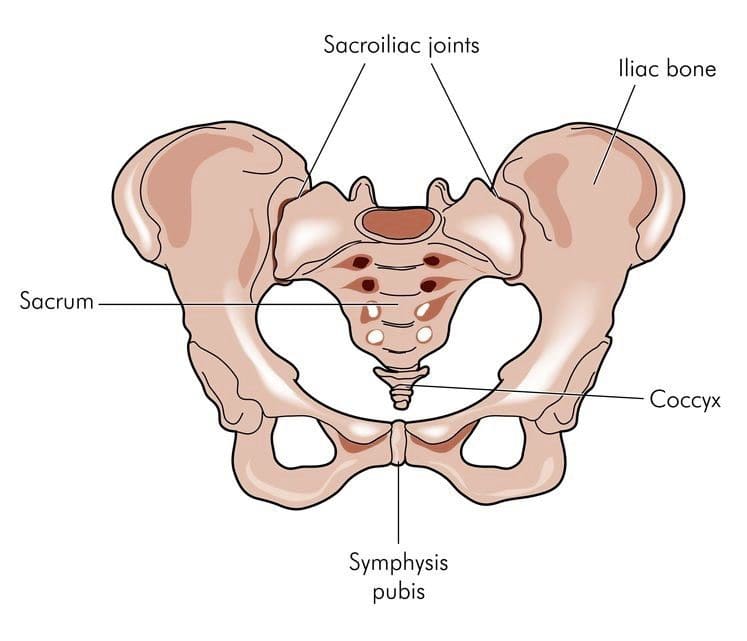Sacroiliac joint dysfunction and its symptoms can cause low back pain and disorders.
This condition is also known as:
- Sacroiliitis
- SI joint inflammation
- SI joint syndrome
- Sacroiliac joint dysfunction
- SI joint strain
It can make it frustrating, difficult, and unbearable for regular activities like sitting, standing, walking, and sleeping. It has been found in around 30-35% of individuals. Many individuals can spend months or even years dealing with symptoms but are unaware that it’s not the correct diagnosis. Sacroiliac joint dysfunction can sometimes be difficult to diagnose. These joints are so close to the hip and lower back that it is common for sacroiliac joint dysfunction to be mistaken for other causes/conditions of lower back pain, like a herniated, slipped, or bulging disc.

Table of Contents
Sacroiliac Joint Dysfunction Symptoms
When low back pain is present, it can be difficult for a doctor to determine the exact source/cause of the pain.
These are a few recognizable symptoms of sacroiliac joint dysfunction.
- Low back pain is the most common.
- Pain could also manifest in the hips, buttocks, thighs, and groin area.
- The pain can be so severe that just touching the area is unbearable.
Other activities that can cause symptoms:
Common movements like climbing stairs and sitting down/getting up from a seat can cause pain. Pain can also be aggravated by standing or walking for extended periods but improve when relaxed or lying down. Stiffness or a burning sensation in the pelvis can also present.

Causes of Joint Dysfunction
A variety of conditions can cause sacroiliac joint dysfunction. The most common:
Arthritis
- Joint pain can be caused by spinal osteoarthritis because the cartilage around the sacroiliac joint wears down.
- The bones can start to rub against each other.
- Ankylosing spondylitis is inflammatory arthritis that affects the spine and can cause joint dysfunction.
Pregnancy
- Pregnant women can experience low back pain or pelvic pain from sacroiliac dysfunction because the joints get stretched and lose their elasticity during pregnancy.
- Hormone changes and added weight during pregnancy can stress the sacroiliac joints.
Accident Trauma
- The high impact from an auto accident, slip-and-fall injury, or sports injury could damage the sacroiliac joint.
Viral Infection
- Infections are extremely rare but could be another cause of joint pain.
- There are a variety of treatment options that can help reduce and prevent low back pain.

Exercise/Physical Therapy
Doctors highly recommend exercise and physical therapy before other treatments like pain medications or surgery. Exercise, chiropractic, and physical therapy can help manage pain and other symptoms. Consult your doctor before starting any physical therapy or exercise program. Your doctor can recommend a chiropractor or therapist who can help you start with the proper exercise treatment plan.
Physical Therapy
Physical therapy can help reduce stress on strained and tight joints and maintain joint flexibility. A physical therapist will perform passive and active treatment therapies to help manage joint pain.
- Passive treatments: The physical therapist does the majority of the work. An example of passive treatment is applying heat or ice and massaging the area.
- Active treatments – the patient participates in the therapy with at-home exercise routines, an example of active treatment.
A combination of passive and active treatment provides the best outcomes and offers the most benefits as the patient learns proper posture, exercises, and injury prevention. A chiropractor and physical therapist can build a physical therapy program to help address your symptoms.
Exercise
With sacroiliac joint dysfunction, you do not have to exercise hard and intensely. The benefits come from a consistent gentle exercise routine emphasizing consistency. Exercising stretches and strengthens the lower back muscles and helps maintain joint flexibility. An overall exercise plan should incorporate the three main types:
- Aerobic workout
- Stretching
- Strengthening
Various gentle exercises and stretches can help decrease pain. Adding exercise and physical therapy to the treatment plan can significantly help manage and reduce pain symptoms.
Chiropractic Care Hip Labral Tear Treatment
NCBI Resources
Sacroiliac joint dysfunction is known to cause low back pain, but diagnosing it can be difficult for some doctors, especially those who do not have a great deal of experience in sacroiliac joint pain. However, chiropractors specialize in this area as the SI joint is an important part of the musculoskeletal system.
Post Disclaimer
Professional Scope of Practice *
The information on this blog site is not intended to replace a one-on-one relationship with a qualified healthcare professional or licensed physician and is not medical advice. We encourage you to make healthcare decisions based on your research and partnership with a qualified healthcare professional.
Blog Information & Scope Discussions
Welcome to El Paso's Premier Wellness and Injury Care Clinic & Wellness Blog, where Dr. Alex Jimenez, DC, FNP-C, a board-certified Family Practice Nurse Practitioner (FNP-BC) and Chiropractor (DC), presents insights on how our team is dedicated to holistic healing and personalized care. Our practice aligns with evidence-based treatment protocols inspired by integrative medicine principles, similar to those found on this site and our family practice-based chiromed.com site, focusing on restoring health naturally for patients of all ages.
Our areas of chiropractic practice include Wellness & Nutrition, Chronic Pain, Personal Injury, Auto Accident Care, Work Injuries, Back Injury, Low Back Pain, Neck Pain, Migraine Headaches, Sports Injuries, Severe Sciatica, Scoliosis, Complex Herniated Discs, Fibromyalgia, Chronic Pain, Complex Injuries, Stress Management, Functional Medicine Treatments, and in-scope care protocols.
Our information scope is limited to chiropractic, musculoskeletal, physical medicine, wellness, contributing etiological viscerosomatic disturbances within clinical presentations, associated somato-visceral reflex clinical dynamics, subluxation complexes, sensitive health issues, and functional medicine articles, topics, and discussions.
We provide and present clinical collaboration with specialists from various disciplines. Each specialist is governed by their professional scope of practice and their jurisdiction of licensure. We use functional health & wellness protocols to treat and support care for the injuries or disorders of the musculoskeletal system.
Our videos, posts, topics, subjects, and insights cover clinical matters and issues that relate to and directly or indirectly support our clinical scope of practice.*
Our office has made a reasonable effort to provide supportive citations and has identified relevant research studies that support our posts. We provide copies of supporting research studies available to regulatory boards and the public upon request.
We understand that we cover matters that require an additional explanation of how they may assist in a particular care plan or treatment protocol; therefore, to discuss the subject matter above further, please feel free to ask Dr. Alex Jimenez, DC, APRN, FNP-BC, or contact us at 915-850-0900.
We are here to help you and your family.
Blessings
Dr. Alex Jimenez DC, MSACP, APRN, FNP-BC*, CCST, IFMCP, CFMP, ATN
email: coach@elpasofunctionalmedicine.com
Licensed as a Doctor of Chiropractic (DC) in Texas & New Mexico*
Texas DC License # TX5807
New Mexico DC License # NM-DC2182
Licensed as a Registered Nurse (RN*) in Texas & Multistate
Texas RN License # 1191402
ANCC FNP-BC: Board Certified Nurse Practitioner*
Compact Status: Multi-State License: Authorized to Practice in 40 States*
Graduate with Honors: ICHS: MSN-FNP (Family Nurse Practitioner Program)
Degree Granted. Master's in Family Practice MSN Diploma (Cum Laude)
Dr. Alex Jimenez, DC, APRN, FNP-BC*, CFMP, IFMCP, ATN, CCST
My Digital Business Card


